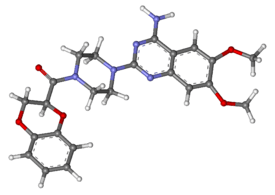Doxazosin
 | |
 | |
| Clinical data | |
|---|---|
| Trade names | Cardura, others |
| AHFS/Drugs.com | Monograph |
| MedlinePlus | a693045 |
| Routes of administration | By mouth (tablets) |
| ATC code | C02CA04 (WHO) |
| Legal status | |
| Legal status |
|
| Pharmacokinetic data | |
| Bioavailability | 65% |
| Protein binding | 98% |
| Metabolism | Liver |
| Biological half-life | 22 hours |
| Identifiers | |
| |
| CAS Number |
74191-85-8 |
| PubChem (CID) | 3157 |
| IUPHAR/BPS | 7170 |
| DrugBank |
DB00590 |
| ChemSpider |
3045 |
| UNII |
NW1291F1W8 |
| KEGG |
D07874 |
| ChEBI |
CHEBI:4708 |
| ChEMBL |
CHEMBL707 |
| ECHA InfoCard | 100.128.642 |
| Chemical and physical data | |
| Formula | C23H25N5O5 |
| Molar mass | 451.475 g/mol |
| 3D model (Jmol) | Interactive image |
| Chirality | Racemic mixture |
| |
| |
| (verify) | |
Doxazosin mesylate, a quinazoline compound sold by Pfizer under the brand names Cardura and Carduran, is an α1-selective alpha blocker used to treat high blood pressure and urinary retention associated with benign prostatic hyperplasia (BPH).
On February 22, 2005, the US FDA approved an extended release form of doxazosin, to be marketed as Cardura XL.
It is an α1 adrenergic receptor blocker that inhibits the binding of norepinephrine (released from sympathetic nerve terminals) to the α1 receptors on the membrane of vascular smooth muscle cells. The primary effect of this inhibition is relaxed vascular smooth muscle tone (vasodilation), which decreases peripheral vascular resistance, leading to decreased blood pressure.
Doxazosin and similar medications like prazosin have been found to help reduce the intensity of and/or stop posttraumatic stress disorder night terrors and nightmares. The full explanation for this effect is not understood.
In Egypt, tablet formulation sold as Duracin produced by Biopharm group for research and the drug industry, Dosin by Eipico and Doxazocine by Multi-Apex.
Efficacy
In March 2000, the Antihypertensive and Lipid Lowering Treatment to Prevent Heart Attack Trial (ALLHAT) study stopped its arm of the trial looking at alpha blockers, because doxazosin was less effective than a simple diuretic, and because patients on doxazosin had a 25% higher rate of cardiovascular disease and twice the rate of congestive heart failure as patients on diuretics.[1] Pfizer, aware of the results before publication, launched a marketing campaign in early 2000, and sales were largely unaffected, despite the dangers highlighted by the study.[2][3]
Doxazosin shows potential for treatment of benign prostatic hyperplasia and erectile dysfunction.[4]
Doxazosin has also shown some efficacy in treating chronic epididymitis.[5]
References
- ↑ Piller LB, Davis BR, Cutler JA, et al. (2002). "Validation of Heart Failure Events in the Antihypertensive and Lipid Lowering Treatment to Prevent Heart Attack Trial (ALLHAT) Participants Assigned to Doxazosin and Chlorthalidone". Curr Control Trials Cardiovasc Med. 3 (1): 10. doi:10.1186/1468-6708-3-10. PMC 149403
 . PMID 12459039.
. PMID 12459039. - ↑ Goldacre, Ben (2012) Bad Pharma How drug companies mislead doctors and harm patients, Fourth Estate, ISBN 0007350740.
- ↑ Lenzer, J (2003). "Spin doctors soft pedal data on antihypertensives". BMJ: British Medical Journal. 326 (7381): 170. doi:10.1136/bmj.326.7381.170. PMC 1128917
 .
. - ↑ "Antihypertensive Drugs and Patients With Erectile Dysfunction". Medscape.
- ↑ Zhou, YC; Xia GS; Xue YY; Zhang XD; Zheng LW; Jin BF (2010–2012). "Kidney-tonifying and dampness-expelling Chinese herbal medicine combined with doxazosin for the treatment of chronic epididymitis". Zhonghua Nan Ke Xue (in Chinese). 16 (12): 1143–6. PMID 21348207.
External links
- Information about Cardura from rxlist.com
- Cardura (doxazosin mesylate) Tablets Full Prescribing Information
